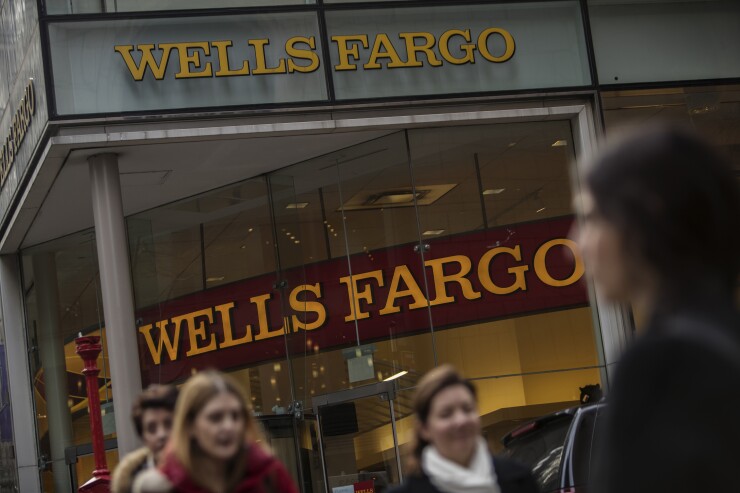In a counterintuitive development that already has consumer groups fuming, Wells Fargo will receive $240 million if a judge approves the proposed settlement of litigation that alleged high-level misconduct in connection with the opening of unauthorized customer accounts.
The settlement would mark a rare instance where the bank stands to benefit monetarily from a scandal that has severely damaged its reputation and cost it hundreds of millions in penalties.
Under an agreement filed Thursday in federal court, unnamed insurance companies agreed to pay Wells to settle allegations that top officials at the San Francisco bank knew about or consciously disregarded the widespread misconduct by lower-level employees.

While some of Wells Fargo’s windfall stands to be offset by attorneys’ fees — the lawyers who brought the case are seeking to recover up to $68 million from the bank — the bank still figures to make money from the litigation.
The proposed settlement aims to resolve various cases known as shareholder derivative lawsuits. These are lawsuits filed by shareholders who are seeking to recover money not for themselves, but rather for the company in which they are part-owners. The suits can be filed when a company has a valid claim against corporate insiders, but has refused to pursue it.
In this case, certain Wells Fargo shareholders sued 20 current and former officers and directors at the $1.9 trillion-asset bank. The list of named defendants includes CEO Tim Sloan, Chief Financial Officer John Shrewsberry, board Chair Elizabeth “Betsy” Duke, former CEO John Stumpf, former board Chair Stephen Sanger and former retail banking head Carrie Tolstedt.
The litigation, which lists public pension systems in Colorado and Alabama as lead plaintiffs, began just weeks after the phony-accounts scandal spilled into public view.
Over the next two-plus years, Wells Fargo turned over more than 700,000 documents to the plaintiffs, and the 20 named defendants turned over more than 19,000 documents. None of the information disclosed in those documents was revealed in the court papers filed on Thursday.
After seven mediation sessions, the parties reached a settlement in principle in December. It calls for Wells to be paid $240 million by insurance companies that issued liability coverage to the current and former officers and directors who were named as defendants.
Of the 20 named defendants, seven still serve as either officers or directors at the $1.9 trillion-asset bank: Sloan, Shrewsberry, Duke and board members John Baker, Donald James, James Quigley and Suzanne Vautrinot.
Wells Fargo said in a securities filing that it has agreed to pay the attorneys’ fees for the plaintiffs. Those lawyers said in a court filing that they anticipate requesting an award of up to $68 million, and they said that Wells fully supports that request. No information was disclosed about Wells Fargo’s own attorneys’ fees, or about whether the bank will be responsible for paying the insurers’ lawyers.
Meanwhile, the pension systems in Alabama and Colorado would receive no more than $25,000 each under the proposed settlement, which would be paid from the fees collected by their lawyers.
Consumer advocates expressed outrage at the settlement's terms.
"First, banks escaped accountability for violations. Now they are somehow able to profit from them?" Kevin Stein, deputy director of the California Reinvestment Coalition, said in an email.
"I don't see how this helps the customers or workers who are the real victims of the litany of Wells Fargo scandals," Ed Mierzwinski, senior director of the federal consumer program at the U.S. Public Interest Research Group, said in an email.
A Wells spokesman declined to offer comment beyond what the bank disclosed in its securities filing. A spokesman for Lieff, Cabraser Heimann & Bernstein, which served as co-lead counsel for the plaintiffs, did not return messages seeking comment.
The court filings note that the 20 defendants continue to deny the allegations made by the shareholders as part of the litigation.
“The defendants have further asserted and continue to assert that, at all relevant times, they acted in good faith and in a manner they reasonably believed to be in the best interests of Wells Fargo and its shareholders,” the proposed settlement reads.
The agreement makes note of various corporate governance reforms that Wells Fargo has adopted since the phony sales scandal surfaced. For example, in October 2016 the company separated the roles of board chair and CEO.
The court filing also points out that Wells Fargo clawed back compensation from defendants. The company said in 2017 that it was clawing back $47 million from Tolstedt and $28 million from Stumpf.
The facts alleged by the plaintiffs were a significant factor in bringing about the corporate governance reforms and the clawbacks, according to the settlement agreement. It says that those moves were worth $80 million to Wells Fargo, bringing the total value of the settlement to $320 million.
Assuming the settlement is valued at $320 million, and assuming it gets approved by U.S. District Judge Jon Tigar, it will be the largest-ever settlement of a shareholder derivative case, according to Kevin LaCroix, an attorney who writes
He noted that the amount of money Wells Fargo stands to collect under the settlement will be significantly less than the total amount it has agreed to pay to government authorities and civil litigants as a result of the bogus-accounts scandal.
Wells Fargo agreed to pay $190 million in fines and restitution in September 2016 in a settlement with the Consumer Financial Protection Bureau, the Office of the Comptroller of the Currency and the Los Angeles City Attorney’s Office.
The bank has also agreed to pay $480 million to settle a class-action lawsuit brought by shareholders and $142 million to resolve a class action filed by consumers.





